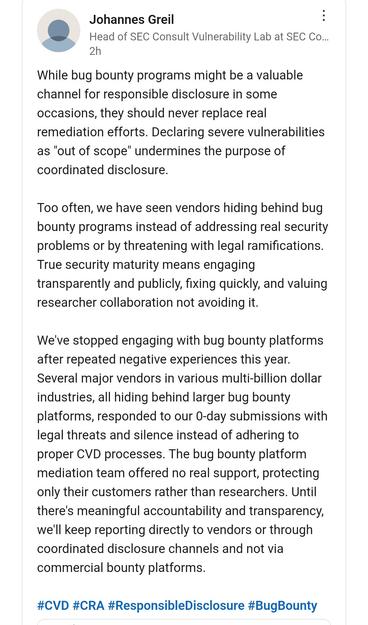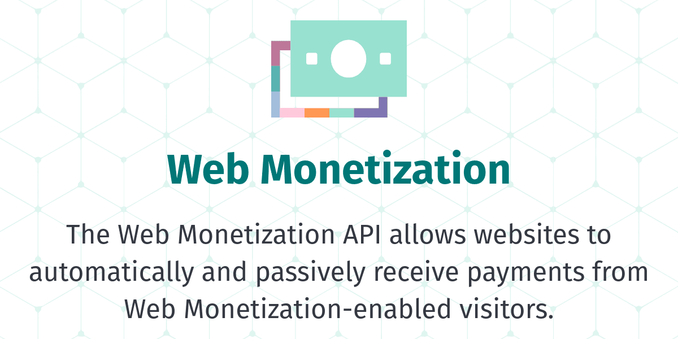Security Flaws in the WebMonetization Site
https://shkspr.mobi/blog/2025/08/security-flaws-in-the-webmonetization-site/
I've written before about the nascent WebMonetization Standard. It is a proposal which allows websites to ask users for passive payments when they visit. A visitor to this site could, if this standard is widely adopted, opt to send me cash for my very fine blog posts.
All I need to do is add something like this into my site's source code:
<link rel="monetization" href="https://wallet.example.com/edent">A user who has a WebMonetization plugin can then easily pay me for my content.
But not every website is created by an individual or a single entity. Hence, the creation of the "Probabilistic Revenue Share Generator".
Probabilistic revenue sharing is a way to share a portion of a web monetized page's earnings between multiple wallet addresses. Each time a web monetized user visits the page, a recipient will be chosen at random. Payments will go to the chosen recipient until the page is closed or reloaded.
Nifty! But how does it work?
Let's say a website is created by Alice and Bob. Alice does most of the work and is to receive 70% of the revenue. Bob is to get the remaining 30%. Within the web page's head, the following meta element is inserted:
<link rel="monetization" href="https://webmonetization.org/api/revshare/pay/W1siaHR0cHM6Ly9leGFtcGxlLmNvbS8iLDcwLCJBbGljZSJdLFsiaHR0cHM6Ly93aGF0ZXZlci50ZXN0LyIsMzAsIkJvYiJdXQ"/>The visitor's WebMonetization plugin will visit that URl and be redirected to Alice's site 70% of time and Bob's 30%.
If we Base64 decode that weird looking URl, we get:
[ [ "https://example.com/", 70, "Alice" ], [ "https://whatever.test/", 30, "Bob" ]]Rather than adding multiple URls in the head, the site points to one resource and lets that pick who receives the funds.
There are two small problems with this.
The first is that you have to trust the WebMonetization.org website. If it gets hijacked or goes rogue then all your visitors will be paying someone else. But let's assume they're secure and trustworthy. There's a slightly more insidious threat.
Effectively, this allows an untrusted 3rd party to use the WebMonetization.org domain as an open redirect. That's useful for phishing and other abuses.
For example, an attacker could send messages encouraging people to visit:
https://webmonetization.org/api/revshare/pay/W1siaHR0cHM6Ly9leGFtcGxlLmNvbS8iLDk5LCJpbWciXV0
Click that and you'll instantly be redirected to a domain under the attacker's control. This could be particularly bad if the domain encouraged users to share passwords or other sensitive information.
If the Base64 data cannot be decoded to valid JSON, the API will echo back any Base64 encoded text sent to it. This means an attacker could use it to send obfuscated messages. Consider, tor example:
https://webmonetization.org/api/revshare/pay/W1siUGxlYXNlIHZpc2l0IFJlYWxfZ29vZF9DYXNpbm9zLmJpeiBmb3IgbG90cyBvZiBDcnlwdG8gZnVuISEhIiwxMjM0NTYsImltZyJdXQ==
Visit that and you'll see a message. With a bit of effort, it could be crafted to say something to encourage a visitor to enter their credentials elsewhere.
When I originally reported this, the site could be used to to smuggle binary payloads. For example, this URl would display an image - however, it seems to have been fixed.
Nevertheless, it is important to recognise that the WebMonetization.org domain contains an unvalidated redirect and forwarding vulnerability.
I recommended that they ensured that the only URls which contain legitimate payment pointers should be returned. I also suggested setting a maximum limit for URl size.
Timeline
#BugBounty #CyberSecurity #ResponsibleDisclosure #WebMonetization #xss





